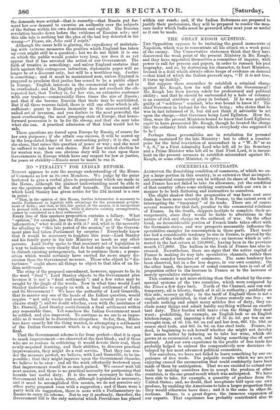NO " FINALITY" FOR INDIAN REFORM. NOBODY appears to rate
the average understanding of the House of Commons so low as its own Members. We judge by the pains bestowed to give a verbal gloss to propositions which are made in the House, although the plainest understanding must be able to see the spurious nature of the stuff beneath. The amendment of which Lord Stanley has given notice for the 23d instant is a case in point : " That, in the opinion of this House, further information is necessary to enable Parliament to legislate with advantage for the permanent govern- ment of India ; and that, at this late period of the session, it is inexpedient to proceed with a measure which, while it disturbs existing arrangements, cannot be considered as a final settlement."
Every line of this specious proposition contains a fallacy. What " omien," for example, has the House ? If it got the "farther rmation," what would it do with it ? and, what is the necessity for alluding to "this late period of the session," as if the Govern- ment plan had taken Parliament by surprise ? Everybody knew that it would be necessary to legislate this year—Lord Stanley and his family party in the late Ministry as much as any other persons. Lord Derby spoke to that necessary act of legislation in a way to indicate very clearly that he had made up his mind—not to disturb existing arrangements, but to continue them ; a propo- sition which would certainly have excited far more angry dis- cussion than the Government measure. Those who object to dis- turbance " ought above all things to object to that idea of an In- dian settlement.
The sting of the proposed amendment, however, appears to lie in the word "final ": Lord Stanley objects to the Government plan because it is not 'a "final settlement "; and a few votes may be caught by the jingle of the words. Now in what time would Lord Stanley undertake to supply us with a final settlement of India and its Government ? We have the authority of Lord Granville, that to master any one of the heads of the Indian question, would require " not only weeks and months, but several years of ex- clusive study "; and we doubt whether, even with the assistance of Mr. Disraeli, Lord Stanley could furnish a final settlement within any reasonable time. Yet somehow the Indian Government must be settled, and also improved. To continue as we are is as impos- sible as it would be to discontinue altogether. So far, then, Minis- ters have exactly hit the thing wanted, in attempting a settlement of the Indian Government which is a step in progress, but not final.
That the Government scheme is far from perfect—that it is open to much improvement—we observed at the first blush; and if those who are so zealous in criticizing it would devote their zeal, their newly-acquired learning, and their abilities, to discover practical improvements, they might do a real service. That they can ren- der the measure perfect, we believe, with Lord Granville, to be im- possible; that they might improve upon the Government ebauche, we believe to be easy : and all the work effectually bestowed upon that improvement would be so much gained. We cannot wait till next session, and there is no practical necessity for postponing that humble but useful duty. It is the more necessary to take the Government bill as a basis, since, although legislation is necessary, and it must be accomplished this session, we do not perceive any other party prepared even with a suggestion ; and if there were a party with its suggestion, there is none with a Parliamentary in- fluence to carry its scheme. Not to say it profanely, therefore, the Government bill is the only material which Providence has placed within our reach ; and, if the Indian Reformers are prepared to justify their pretensions, they will be prepared to render the mea- sure under which India must be governed after next year as useful as it can be made.


























 Previous page
Previous page